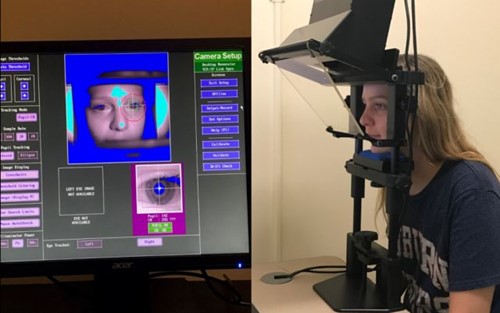Pictured above is our Eyelink 1000 Plus eye-tracker. Eye-tracking helps us determine how people make sense of language while listening or reading.
Individual Differences in Cognitive Persistence
The ability to overcome difficulty or challenges is essential for daily tasks. This project is investigating different measures that capture cognitive persistence, how the brain overcomes challenges, and why some people are more persistent than others.
Speech Recognition
Speech can be particularly difficult to understand in an environment that has background noise. This project looks at what cognitive and neural processes are involved in understanding speech when there is an interruption or interference from a noisy environment. We are particularly interested in the role of inhibitory control, the ability to suppress irrelevant information. We are testing how individual differences in inhibitory control affect understanding of speech in noise and whether temporarily boosting inhibitory control can improve speech recognition.
Cognitive Training and Language Processing
The brain is plastic and changes with experience. This project observes how cognitive training affects the brain and the extent to which this training improves performance on untrained tasks. We are currently developing and testing training paradigms that target speech and language processing in challenging conditions.
Aging Brain
Aging produces widespread declines in cognitive and sensory processes, including processing speed, attention, memory, and hearing. These declines are precipitated by changes in the structure and function of the brain. We are investigating changes in the brain that lead to cognitive decline in healthy aging, and how these changes affect speech and language comprehension.

